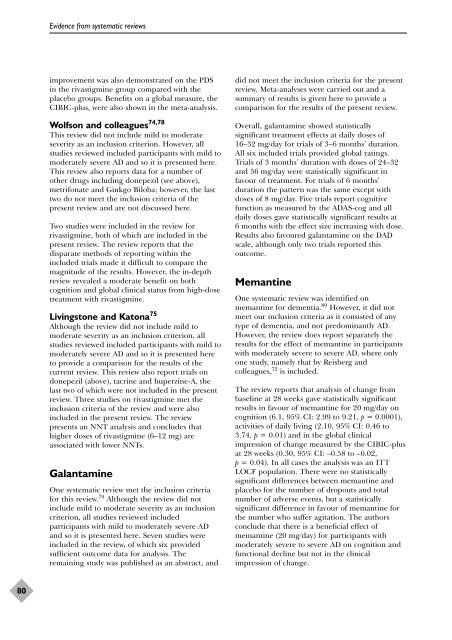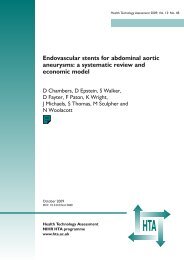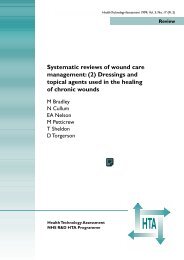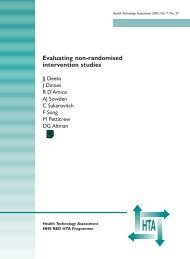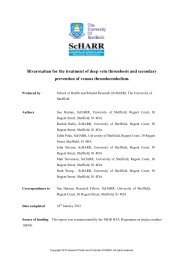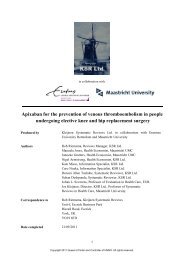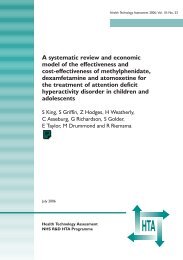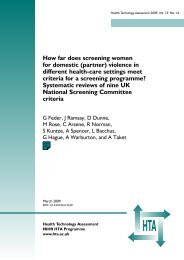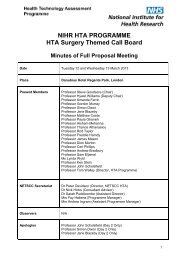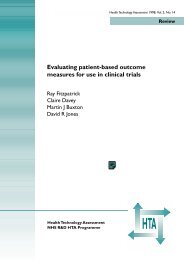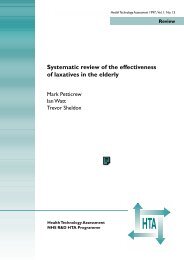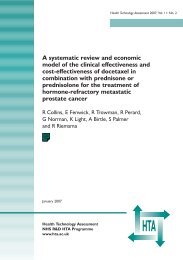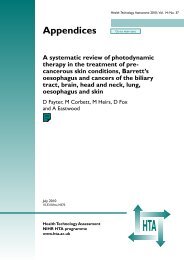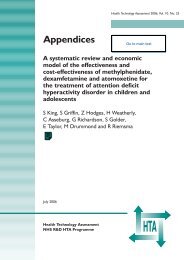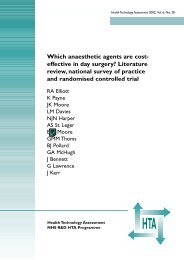Donepezil, rivastigmine, galantamine and memantine for ...
Donepezil, rivastigmine, galantamine and memantine for ...
Donepezil, rivastigmine, galantamine and memantine for ...
You also want an ePaper? Increase the reach of your titles
YUMPU automatically turns print PDFs into web optimized ePapers that Google loves.
80<br />
Evidence from systematic reviews<br />
improvement was also demonstrated on the PDS<br />
in the <strong>rivastigmine</strong> group compared with the<br />
placebo groups. Benefits on a global measure, the<br />
CIBIC-plus, were also shown in the meta-analysis.<br />
Wolfson <strong>and</strong> colleagues 74,78<br />
This review did not include mild to moderate<br />
severity as an inclusion criterion. However, all<br />
studies reviewed included participants with mild to<br />
moderately severe AD <strong>and</strong> so it is presented here.<br />
This review also reports data <strong>for</strong> a number of<br />
other drugs including donepezil (see above),<br />
metrifonate <strong>and</strong> Ginkgo Biloba; however, the last<br />
two do not meet the inclusion criteria of the<br />
present review <strong>and</strong> are not discussed here.<br />
Two studies were included in the review <strong>for</strong><br />
<strong>rivastigmine</strong>, both of which are included in the<br />
present review. The review reports that the<br />
disparate methods of reporting within the<br />
included trials made it difficult to compare the<br />
magnitude of the results. However, the in-depth<br />
review revealed a moderate benefit on both<br />
cognition <strong>and</strong> global clinical status from high-dose<br />
treatment with <strong>rivastigmine</strong>.<br />
Livingstone <strong>and</strong> Katona 75<br />
Although the review did not include mild to<br />
moderate severity as an inclusion criterion, all<br />
studies reviewed included participants with mild to<br />
moderately severe AD <strong>and</strong> so it is presented here<br />
to provide a comparison <strong>for</strong> the results of the<br />
current review. This review also report trials on<br />
donepezil (above), tacrine <strong>and</strong> huperzine-A, the<br />
last two of which were not included in the present<br />
review. Three studies on <strong>rivastigmine</strong> met the<br />
inclusion criteria of the review <strong>and</strong> were also<br />
included in the present review. The review<br />
presents an NNT analysis <strong>and</strong> concludes that<br />
higher doses of <strong>rivastigmine</strong> (6–12 mg) are<br />
associated with lower NNTs.<br />
Galantamine<br />
One systematic review met the inclusion criteria<br />
<strong>for</strong> this review. 79 Although the review did not<br />
include mild to moderate severity as an inclusion<br />
criterion, all studies reviewed included<br />
participants with mild to moderately severe AD<br />
<strong>and</strong> so it is presented here. Seven studies were<br />
included in the review, of which six provided<br />
sufficient outcome data <strong>for</strong> analysis. The<br />
remaining study was published as an abstract, <strong>and</strong><br />
did not meet the inclusion criteria <strong>for</strong> the present<br />
review. Meta-analyses were carried out <strong>and</strong> a<br />
summary of results is given here to provide a<br />
comparison <strong>for</strong> the results of the present review.<br />
Overall, <strong>galantamine</strong> showed statistically<br />
significant treatment effects at daily doses of<br />
16–32 mg/day <strong>for</strong> trials of 3–6 months’ duration.<br />
All six included trials provided global ratings.<br />
Trials of 3 months’ duration with doses of 24–32<br />
<strong>and</strong> 36 mg/day were statistically significant in<br />
favour of treatment. For trials of 6 months’<br />
duration the pattern was the same except with<br />
doses of 8 mg/day. Five trials report cognitive<br />
function as measured by the ADAS-cog <strong>and</strong> all<br />
daily doses gave statistically significant results at<br />
6 months with the effect size increasing with dose.<br />
Results also favoured <strong>galantamine</strong> on the DAD<br />
scale, although only two trials reported this<br />
outcome.<br />
Memantine<br />
One systematic review was identified on<br />
<strong>memantine</strong> <strong>for</strong> dementia. 80 However, it did not<br />
meet our inclusion criteria as it consisted of any<br />
type of dementia, <strong>and</strong> not predominantly AD.<br />
However, the review does report separately the<br />
results <strong>for</strong> the effect of <strong>memantine</strong> in participants<br />
with moderately severe to severe AD, where only<br />
one study, namely that by Reisberg <strong>and</strong><br />
colleagues, 72 is included.<br />
The review reports that analysis of change from<br />
baseline at 28 weeks gave statistically significant<br />
results in favour of <strong>memantine</strong> <strong>for</strong> 20 mg/day on<br />
cognition (6.1, 95% CI: 2.99 to 9.21, p = 0.0001),<br />
activities of daily living (2.10, 95% CI: 0.46 to<br />
3.74, p = 0.01) <strong>and</strong> in the global clinical<br />
impression of change measured by the CIBIC-plus<br />
at 28 weeks (0.30, 95% CI: –0.58 to –0.02,<br />
p = 0.04). In all cases the analysis was an ITT<br />
LOCF population. There were no statistically<br />
significant differences between <strong>memantine</strong> <strong>and</strong><br />
placebo <strong>for</strong> the number of dropouts <strong>and</strong> total<br />
number of adverse events, but a statistically<br />
significant difference in favour of <strong>memantine</strong> <strong>for</strong><br />
the number who suffer agitation. The authors<br />
conclude that there is a beneficial effect of<br />
<strong>memantine</strong> (20 mg/day) <strong>for</strong> participants with<br />
moderately severe to severe AD on cognition <strong>and</strong><br />
functional decline but not in the clinical<br />
impression of change.


